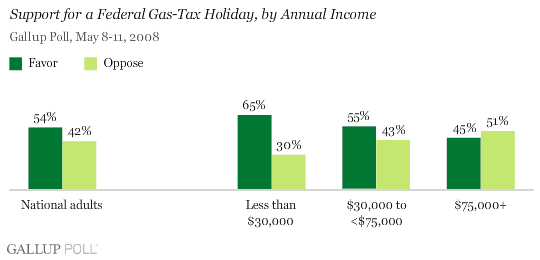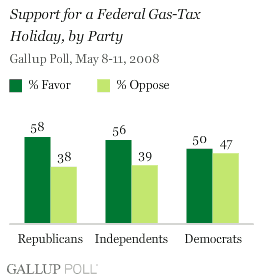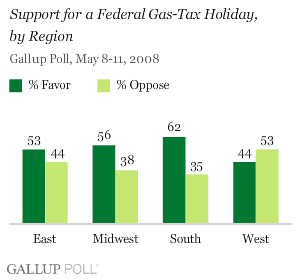PRINCETON, NJ -- While Americans favor suspending the federal gas tax for the summer by a 54% to 42% margin, they differ in their support by income: 65% of lower-income households and 55% middle-income households are in favor, while 51% of upper-income households are opposed.

Unusual Coalition Supports Suspending Federal Gas Tax
The federal gas tax as a form of sales tax is generally recognized as being a regressive tax -- one that places a disproportionately higher burden on lower-income than on upper-income households. Because surging gas prices at the pump are also among lower- and middle-income Americans, it is not surprising that majorities of both of these income groups support a suspension of the federal gas tax for the summer.
In this same vein, it is not unreasonable that a majority of upper-income Americans oppose suspending the federal gas tax for the summer -- possibly seeing it as something of a political gimmick in an election year. The relatively small size of the federal gas tax and the temporary nature of this tax relief would provide comparatively little benefit given today's soaring gas prices. In addition, it would do nothing to address the real source of the gas price explosion. In fact, economists widely oppose the idea.
Republicans support a suspension of the federal gas tax by a 58% to 38% margin -- again, no surprise given their usual opposition to any form of tax and given presumptive Republican presidential nominee John McCain's support for such a temporary tax holiday. Independents also support suspending the gas tax by 56% to 39%. However, Democrats are more evenly split, with 50% in favor and 47% opposed to the gas-tax suspension. Traditionally, Democrats tend to be less favorably inclined to support actions that reduce the tax base, but this tendency is often offset by their desire to reduce the tax burden on lower- and middle-income Americans. In this instance, the split among Democrats seems to reflect the split between the presidential candidates, with Hillary Clinton supporting a federal gas-tax holiday and her supporters doing likewise by a 66% to 28% margin, and Barack Obama opposing it and his supporters agreeing, by 60% to 39%.
Finally, support for a federal gas tax suspension is strongest in the South, where it is favored by a 62% to 35% margin, and weakest in the West, where it loses by 44% to 53%. Majorities in the East (53%) and Midwest (56%) are in favor of suspending the tax.


Commentary
While traditional political theory suggests that any tax reduction in an election year should have political benefits at the polls, economic tax incidence theory suggests that suspending the federal gas tax may provide little, if any real cost-savings benefit to the average American consumer. Just as part of the tax burden associated with the federal gas tax is borne by producers, servicers, and stockholders, the benefits associated with removing it will also accrue to these groups. Further, given the recent surge in gas prices at the pump, any residual benefits may be virtually imperceptible to the consumer.
More importantly, a temporary suspension of the federal gas tax would do nothing to address the fundamental issues surrounding the surge in gas prices at the pump. In part, these issues relate to the political standoff between those who want to produce more and those who oppose any potential environmental impact of such efforts. About the only consensus is that , and today's much higher energy prices should help achieve this goal.
Still, probably the most remarkable aspect of the current oil and gas price explosion has to do with the charade that today's higher prices are being determined by so-called "free market" forces. Nothing more clearly shows how false this myth is than President Bush's current trip to lobby Middle East oil producers to do what they can to help lower the current price of oil. Past ║┌┴¤═° surveys have shown that many Americans think the . Given today's record gas prices -- even on an inflation-adjusted basis -- it seems likely that this will be the case again this election year, and how the presidential candidates respond to this issue is likely to be much more important than their position on having a federal gas-tax holiday this summer.
Survey Methods
Results are based on telephone interviews with 1,017 national adults, aged 18 and older, conducted May 8-11, 2008. For results based on the total sample of national adults, one can say with 95% confidence that the maximum margin of sampling error is ┬▒3 percentage points.
Interviews are conducted with respondents on land-line telephones (for respondents with a land-line telephone) and cellular phones (for respondents who are cell-phone only).
In addition to sampling error, question wording and practical difficulties in conducting surveys can introduce error or bias into the findings of public opinion polls.
To provide feedback or suggestions about how to improve ║┌┴¤═°.com, please e-mail feedback@gallup.com.
